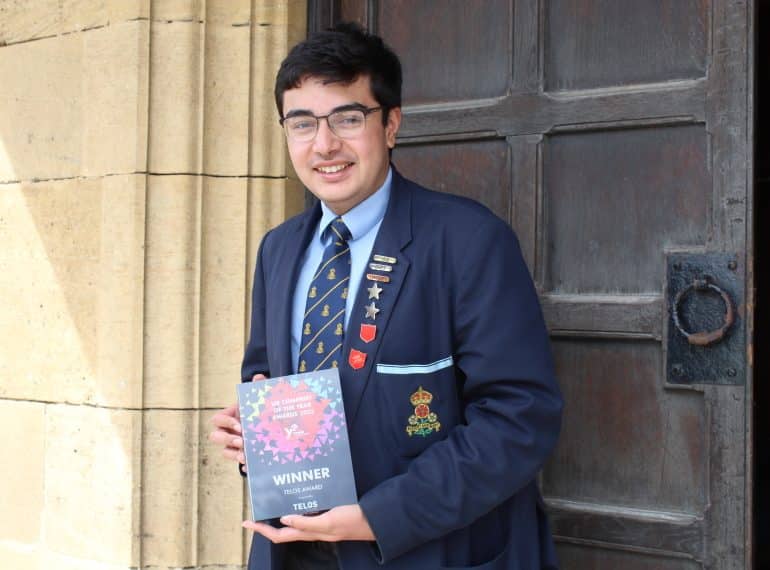
Pupil Saim Khan drew on his own experience with QE’s Young Enterprise team to identify ‘character’ as a key attribute for leaders of smaller groups in a prize-winning essay.
Saim, who was in Year 10 in 2021–2022, took the top prize in the Sustainable Success Essay Competition run by management consultants Telos Partners in partnership with Young Enterprise nationally. He wins £1,000 and four hours of mentoring from Telos Partners.
His winning words focused on the particular nature of the leadership of small groups, where, he wrote, character was especially important: “You need to inspire and make people want to follow you.”
The competition, which was for those aged 14–18, gave entrants this challenge: Using your own thoughts, ideas and experiences what do you believe are the qualities of a leader that is able to lead an organisation not only to short-term success, but one that will be successful for many generations to come?
The competition briefing also included this quotation from United States Army general Norman Schwarzkopf, who led the coalition forces in the 1991 Gulf War: “Leadership is a potent combination of strategy and character. But if you must be without one, be without the strategy.”
Saim was a senior member of a QE Young Enterprise that offered ‘stress balls’ for sale during the year. The team took part in a Young Enterprise trade fair and also had a stall at The Friends of Queen Elizabeth’s School fete on Founder’s Day in June. There, they took a two-pronged approach, selling their remaining stock and running a Make your own stress ball activity, which particularly drew in younger boys.
Saim said that participating in Young Enterprise this year was “a great, different experience”, while the essay competition was “a reflective opportunity to academically tie it off and consider what I’ve learned”. He noted that he generally enjoys essay-writing too.
His essay, which included case studies, reflected his observation that, in the news, leadership is usually considered at a large or national scale. Little or no reference is made to the sort of small-group leadership involved in Young Enterprise, where a company might comprise only about 25 people. Leadership of such a group, and others like it, needs to be more dynamic and more equal, with less of a ‘leader and subordinates’ ethos. At this scale, he viewed character as being especially important: “You need to inspire and make people want to follow you.” By contrast, at a larger scale, not everyone will know you, and therefore character can be less important. “The CEO of Apple needs a strategy, but for regional managers it is more about managing people,” he said.
Other specific lessons drawn from his Young Enterprise experience that he covered in the essay were:
- How to include everyone in the group in big decisions
- How this creates unity
- What to do when things go wrong.
On this last point, Saim said: “Things go wrong quite a lot! For example, a week before the trade fair, we had under half of our expected stock. It’s important not to panic – do first, panic later.” Accordingly, the team simply got on with the meetings necessary to put things right.
“In other clubs, people share a defined passion, or it is more structured. Young Enterprise leaves it up to pupils to make decisions. We didn’t start all united in our interests, so there was scope for debate and discussion.”
With his company, decision-making was initially all taken by voting at the wider group level. “We realised as we went on that this was inefficient. We then had four–five people who took on leadership roles and made more decisions.”
Since this resulted in other members of the team feeling “less personally invested”, there was further refinement of the decision-making process, with company votes reintroduced for more important decisions. In short, he said, strategy was then determined by the whole company, with implementation delegated to a smaller group of leaders.
Saim was invited to a Young Enterprise Company Programme Final, during which it was announced that he had taken the top prize. “I was really surprised to win this – a national competition. I knew I could write a good essay, but you are competing against so many other people. It was a pleasant surprise to be invited to the final and I was then ecstatic to find out I’d won.”
He has yet to decide how to spend his prize money.
